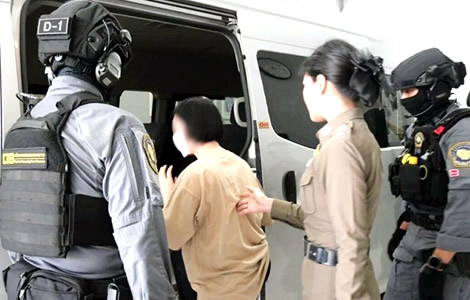Chinese fugitive Zhou Jinghua’s 30-year reinvention in Thailand ends in extradition. Once a respected wife and mother, she is now facing justice for embezzlement. Her case exposes identity fraud, Thai system failures and China’s relentless pursuit abroad.
A middle-aged Chinese woman, once a respected wife and mother in Thailand, was this week handed back to China. She now faces harsh prosecution for embezzling state funds more than 30 years ago. Her case exposes Beijing’s relentless reach—and the growing wave of Chinese nationals reinventing themselves in Thailand.

Over three decades ago, a Chinese woman, a wife and mother, found herself caught up in serious crime in Communist China. As a state official, she was embezzling state funds. Certainly, it was as serious a charge as it comes — sometimes notably, sending top officials to their deaths through state execution. However, it certainly meant a stiff jail sentence and a life of shattered prospects.
That was what Zhou Jinghua decided to start over from. Using forged identities, she crossed the border into Thailand. For three decades, she lived a new life, including marrying a Thai man and subsequently bringing her Chinese children into the kingdom.
Zhou Jinghua’s escape from China and new life in Thailand under forged identities and new family ties
Her story is not uncommon. It chimes with that of Chinese criminal mastermind Ms. Navaporn Phakiatsakul, who was arrested out of the blue in April 2023 in Bangkok for human trafficking.
The Thai woman had built a business empire from providing underground surrogacy services to Chinese couples in Thailand. Indeed, her children were left in command of a legitimate business empire with billions of baht, including a thriving insurance business..
Similarly, Zhou Jinghua’s life is a tangled web of identities, deception, and escape. Born and raised in China, Zhou was married to Xu Jinhong in 1987. Together, they had three children. Despite this stable beginning, Zhou chose to sever her past completely.
Eventually, she fled China after being accused of embezzling state assets using her official position. She then created an entirely new life in Thailand under multiple aliases.
Initially, Zhou lived as Zhou Chanling, Xu Chanling, and Chanlin Xu—names she used to forge documents. Consequently, she managed to enter Thailand under false pretences, evading Chinese authorities for decades.
Moreover, Zhou did not stop there. She married a Thai man named Rungsak Sae Tia in Bangkok in 1988, using the forged name Chanlin Su. This marriage was not genuine; instead, it was a calculated move to obtain Thai citizenship.
Manipulated birth records and nationality fraud reveal flaws in Thailand’s citizenship and identity system
The birth records of her children were also manipulated. Although her three children were born in China to Xu Jinhong, their birth certificates in Thailand listed Rungsak as their father.
Thus, Zhou’s family officially became Thai nationals, masking their true origin. The implications of this deception extend beyond Zhou’s personal story. They reveal significant gaps in Thailand’s identity verification and citizenship processes.
For 31 years, Zhou lived quietly in Thailand, free from legal consequences. She was known as Methawarin Chaibunyaratnakul, a respected Thai citizen.
However, this peace was shattered in 2023 when the Chinese government formally requested her extradition. Beijing had prioritised her case after uncovering her long evasion. As a result, Thailand had to respond to growing diplomatic pressure.
The extradition process began with Zhou’s arrest in October 2023. The Royal Thai Police, working with the Department of Corrections, detained her at the Central Women’s Correctional Institution.
Zhou then faced a series of legal battles. Initially, the Criminal Court ordered her detention pending extradition. Although Zhou appealed, the Court of Appeal upheld the decision just this month.
Thailand’s legal compliance in extradition and citizenship revocation amid concerns over political prosecutions
Significantly, Thailand’s handling of this case followed the Extradition Act and the treaty signed with China in 1993. The Department of Corrections emphasised that the extradition complied fully with laws and regulations.
On the other hand, the Chinese woman used fraud and deception to establish herself here. Undeniably, this extinguished any right she may have been able to claim as a Thai citizen.
Indeed, adding complexity to Zhou’s case was the revocation of her Thai citizenship. The Ministry of Interior, led by General Anupong Paochinda in 2023, declared her naturalisation invalid.
According to them, Zhou obtained citizenship by concealing facts and presenting false information during her marriage registration. Under Section 16 of the Nationality Act, this was grounds for revocation. Consequently, an official announcement revoked her Thai nationality on July 1, 2023.
This decision directly impacted Zhou’s children. Born to Zhou and Xu Jinhong in China, they were registered as Thai nationals under false circumstances. Their status now became uncertain, exposing them to risks of statelessness or legal complications.
This highlights how one person’s actions can affect an entire family, especially in cases involving identity fraud and nationality laws.
Zhou’s case exposes weaknesses in border controls and the complex geopolitical balancing act of extradition
Interestingly, Zhou’s escape to Thailand exposed weaknesses in border and immigration controls. Despite multiple forged documents and names, she lived openly without detection for decades. This raises questions about Thailand’s capacity to monitor long-term migrants and verify citizenship applications. Furthermore, it suggests vulnerabilities that can be exploited by individuals fleeing justice.
The case also illuminates China’s approach to pursuing alleged economic criminals overseas. In recent years, Beijing has intensified efforts to bring back fugitives, often through aggressive diplomatic pressure.
While state embezzlement is a particularly serious crime, China’s political motivations cannot be ignored. Its use of extradition requests sometimes serves broader state interests beyond pure justice.
Thailand found itself balancing between international law, diplomatic relations and human rights concerns. On one hand, honouring treaties and cooperating with China was necessary to maintain bilateral ties. On the other hand, ensuring that extradition requests respect due process and individual rights is vital. Zhou’s case highlights the delicate position smaller countries face in global geopolitics.
Zhou’s extradition raises unanswered questions on fairness and the wider implications for justice
The official handover of Zhou to Chinese authorities was completed on July 18, 2025. The Department of Corrections assigned representatives to transfer custody, along with the Royal Thai Police and public prosecutors.
Despite the legal finality, many questions remain. Was Zhou given a fair chance to defend herself? Will her rights be protected under the Chinese justice system?
Moreover, Zhou’s story is a human drama of reinvention and survival. For years, she eluded her past by building a new identity and family. Yet, in the end, her constructed life unravelled. It shows the lengths to which some will go to escape accountability.
Certainly, Zhou Jinghua’s case is not just about a woman convicted of embezzlement. It exposes larger issues of legal sovereignty, nationality fraud and international justice. While Thailand complied with legal requirements, the ethical implications are complex. Her life illustrates how identity can be manipulated and how determined political power shapes the pursuit of justice.
Zhou’s story warns of the need for stronger safeguards amid global issues of justice and fluid identities
Ultimately, Zhou’s story is a cautionary tale. It highlights the determined pursuit of criminals by Chinese authorities. Nevertheless, it challenges us to consider what justice means in a world where borders and identities are increasingly fluid.
Undoubtedly, it calls for stronger safeguards to prevent abuse of both national and international legal systems. Undoubtedly, there are many more like Ms. Zhou living in Thailand today.
Chinese invasion claim by Chuwit saying there are now 3 million new arrivals in tourist hotspots
Thailand, China forge closer ties with permanent visa-free access between both countries on March 1st 2024
Thai Chinese criminal matriarch has built a safe empire and legitimate fortune for her three Thai children
Whether they are a threat to national security or an economic opportunity brought about by underground immigration is a political debate raging not only in Thailand but also right now in Europe, the United States and across the world.
Ultimately, it resolves to a moral issue. Should law and order be rigidly upheld, or are people entitled to a second chance, a break or simple mercy? Of course, the problem is that an immigrant who breaks the law in one country is likely to do it in another. In turn, this poses a threat to innocent law-abiding citizens.
Join the Thai News forum, follow Thai Examiner on Facebook here
Receive all our stories as they come out on Telegram here
Follow Thai Examiner here
Further reading:
Chinese invasion claim by Chuwit saying there are now 3 million new arrivals in tourist hotspots
Charges brought against Chinese mafia kingpin as Chuwit warns witnesses are put under pressure
DSI chief removed from his post as scandal over a raid on a former diplomatic residence grows
Chinese gangs approaching expectant Thai fathers in private hospitals seeking identity transfers
Top Immigration Bureau officers investigated by high-level panel over Chinese corruption claims
Chinese-controlled Thai language schools used by criminal network to obtain visas for associates
Arrest and detention of alleged Chinese crime boss puts political pressure on Palang Pracharat Party
Chuvit claims Chinese gangster billionaire may be still at large in Thailand as is his executive jet
Net set to widen on Chinese money gangs, top police officer warns of powerful financial interests
Colourful Bangkok former sex industry tycoon Chuwit told to quit sniping by an aide to the PM


















